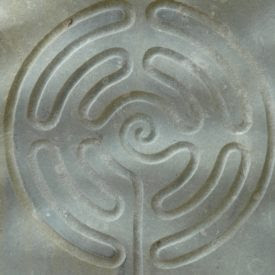The reason, he’s told, is because he’s too good and parents want their kids to play. But, watching his former teammates head into practice, he has this exchange with the priest who taught him the game:
“It’s because I’m an Indian, isn’t it?”
“Yes,” Father Leboutilier said.
“Do they hate me?”
“They don’t hate you, Saul.”
“Well, what, then?”
“They think it’s their game.”
“Is it?”
I could hear the crack of our tires in the frost on the road. “It’s God’s game,” he said.
“Where’s God now, then?” I asked.
Saul Indian Horse’s question – Where’s God now? – came to my mind as I studied this Sunday’s lectionary passage from Joshua. Joshua’s speech to the gathered tribes of Israel begins with a reminder that nothing they have is “theirs,” everything is a gift from God. Preceding the lectionary selection for this Sunday, verses 1-13 recount all that God has given: the offspring of Abraham, freedom from slavery in Egypt, security and sustenance while wandering in the wilderness, new land to build and plant.
Remember this, Joshua says, and “choose this day whom you will serve.” Will the Israelites retire the gods of their ancestors, put the past behind them and turn to serving the Lord in sincerity and faithfulness? In this scriptural scene, the Israelites choose wisely and faithfully. “We also will serve the Lord, for he is our God.”
But this choice between God and gods will arise time and time again. And our history as a people of faith is spotty when it comes to this choice. The little gods are always tempting. Idolatry a sin to which we are highly prone. Our clarity about where our gifts come from easily gets muddied by the gods of capitalism, nationalism and individualism. Our perspective is skewed by our society — particularly a society in crisis, hellbent on protecting what is “mine.”
I’ve always appreciated our Reformed faith’s emphasis on the sin of idolatry. As people of faith, we are wise to remember that we are mere stewards of the gifts God has entrusted to us. Everything we have is a gift from God — our land, our homes, our wealth, our planet, our very lives. Mark Elsdon, in his book, “We Aren’t Broke: Uncovering Hidden Resources for Mission and Ministry,” highlights an important distinction between ownership and possession. “God owns,” Elsdon writes. “Humans just possess for the time being. The vital truth that everything we have is on loan from God is bedrock to living a life rich toward God and not constantly yearning for increase.”
Elsdon goes on to illustrate our American culture’s obsession with private ownership and our impulse to protect what we have by offering a comparison of hiking opportunities in England and the United States. As a dual citizen of Britain and the U.S., Elsdon shares how refreshing it is to be able to hike for miles on public paths through the English countryside that wind their way through private land. These public paths “provide access to the countryside that would otherwise be off-limits due to private ownership.” Elsdon compares this to an experience he had in California where he and a friend were eager to hike in a national forest, only to discover that access to the public trailhead was blocked by private land. Elsdon describes the gate he and his friend encountered: “It was covered in huge bright signs. It said, ‘This is private property! You are being watched on video. No trespassing. You will be sorry if you keep going,’ and other ominous threats.”
This American obsession with ownership feels especially heightened in our current culture war regarding COVID-19, masks and vaccinations. I keep hearing references to my rights, my freedoms, my body, my choice, my comfort, my convenience. In this national moment, Christians would be well served to reconsider Joshua’s imperative: “Choose this day whom you will serve.” Will we bow before the god of individualism, the god of “me and mine,” the god of tribalism and sectarianism? Or will we choose God, the Creator, from whom all blessings flow? Will we bow before God who gives generously and expects us to give and live generously in return?
In “Indian Horse,” Wagamese highlights the trials of the Ojibway people, but also the strength and nobility of their community. The book concludes with a scene illustrating how a community of people can heal and save when their hearts aren’t possessed by selfishness. Saul Indian Horse, now a grown man accustomed to the hateful abuse of racism, is back on the ice, contemplating the game he once loved and played with joy. In this scene, though, he is not rejected. Ojibway kids, of assorted ages and sizes, glide out onto the ice to join him, followed by former teammates and older men and women. Everyone has a hockey stick. They gather in a circle around Saul. There are so many of them. Saul asks their leader, Fred: “How are we gonna do this with all these people? How we gonna play the game?”
Fred smiles and taps Saul’s stick with his. “Together,” he says. “Like we shoulda all along.”
Friends in faith, every moment of every day the choice is before us. Who will we choose to serve?
Questions for reflection:
- How did this passage intrigue, disturb, challenge, comfort, encourage or inspire you?
- What gifts from God are you particularly grateful for today?
- What gods tempt you? What are you tempted to place above God in your life?
- Who do you choose to serve? How is this choice reflected in your daily life?











No comments:
Post a Comment